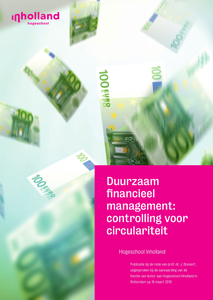In deze publicatie wordt een 'tool' aangeboden om te komen tot het optimaliseren van de technische bedrijfsvoering. Deze tool is ontwikkeld in het kader van het project "Procesinnovatie Verspaning voor MKB-bedrijven".
DOCUMENT

Het voorliggende onderzoeksverslag inventariseert de effecten van het kabinetsbeleid op de bedrijfsvoering en dienstverlening van woningcorporaties. Hiervoor zijn 410 respondenten benaderd in augustus 2013 en is van 156 een volledig ingevulde enquête ontvangen. De enquête bestaat uit verschillende modules. Gevraagd is naar de doorgevoerde en voorgenomen veranderingen in bedrijfslasten, werkorganisatie, dienstverlening en digitalisering van de bedrijfsvoering.
DOCUMENT

In deze rede willen we helder krijgen welke ontwikkelingen in het bedrijfsleven van invloed zijn op ondernemingen en het financieel management van deze ondernemingen. Met name het streven naar een circulaire economie wordt als een ontwikkeling van betekenis gezien.
DOCUMENT

Twee jaar draaide het project Slim Organiseren in het MKB. Studenten en docent-onderzoekers gingen bij twintig bedrijven aan de slag om de bedrijfsvoering en de productieprocessen te verbeteren. Gaandeweg ontstond een duurzaam en stabiel bedrijvennetwerk. Film in het kader van het project Van Weten naar verwezenlijken. Gemaakt tijdens het slotcongres van het project. Deze korte versie is getoond tijdens de relatieavond van de Hanzehogeschool Groningen op 16 april 2014.
YOUTUBE

This relationship between external knowledge providers, e.g. consultants and academic institutions, and small and medium enterprises (SMEs) is a difficult one. SME entrepreneurs think external advice is expensive, not required and/or not useful. In this paper these arguments are explored against the specific characteristics of SMEs. The argument of price probably tells more about the consultants inability to quantify the returns on their advice than about the cost of their services. Support policies enable free consults for SMEs on numerous topics, but the use of these facilities is relatively low. The suggestion that SME entrepreneurs do not need external knowledge is contradicted by their own assessment of their qualities. Typically the entrepreneurs lack expertise in supporting business functions like HR, IT, Finance and Legal. In SMEs these blank spots are not compensated by specialist staff members because the of the scale of the organization. The argument that the advice of an external consultant is generally not useful raises the question whether the insights gained in several business sciences only apply to large companies. This seems unlikely. Given the characteristics of SMEs the difference is probably more the context in which the insights are applied than the content of the insights itself. From the analysis of the characteristics of SMEs the dominant influence of the person of the owner/director, together with the absence of specialist staff, appeared as two of the most significant differences between SMEs and large companies. Given the personal profiles of these owners/directors as studied by Blom (Blom, 2001), the external knowledge providers should realize the three ways in consulting. The first way is the way of thinking. For this way it was stated already that the content of business sciences is not likely to differ for SMEs. The second way, the way of working, represents for the way information is gathered and the entrepreneur and his staff is involved in the process of developing the advice. In this way the consultant should allow for interaction and should make it fun for the participants. In this aspect, the process approach of consulting shows promising. The third way, the way of communicating, represents the way the knowledge is transferred from the advisor to the entrepreneur. In this way it is crucial to acknowledge the different personal profiles of SME entrepreneurs and consultants and to adjust the communication accordingly. Taking the three ways into account, the conclusion could be that the transfer of knowledge should be more the sharing of experiences. The Chair of Management Consulting will adjust her activities to explore this insight further.
DOCUMENT

Technische Bedrijfskunde student Pung Marnickam heeft de Socialistische Partij geholpen met het in kaart brengen van alle overheidsmaatregelen en wetten voor het Midden en Kleinbedrijf gedurende de laatste drie jaar. Deze informatie wordt gebruikt voor het ontwikkelen van een nieuwe beleidsvisie.
LINK
In het boek is een overzicht te vinden van de verschillende kenniscentra en lectoren van de HU. Per kenniscentrum worden de verschillende onderzoeksterreinen beschreven en de lectoren voorgesteld.
DOCUMENT

Een derde van het totale personeelsbestand van de Technische Universiteit Eindhoven (TU/e) bestaat uit ondersteunend beheerspersoneel (OBP). Dit betekent dat ruim 1.200 mensen binnen onze universiteit een belangrijke taak vervullen ondersteunend aan het primaire proces van onze universiteit: onderwijs, onderzoek en kennisvalorisatie. Een deel van het OBP werkt binnen de faculteiten, een andere deel binnen de centrale diensten van de TU/e. Ondanks het feit dat OBP’ers een groot deel van ons personeelbestand vormen, is het loopbaanbeleid voor deze groep nog niet zover ontwikkeld als voor het wetenschappelijk personeel (WP). In 2009 besloten we als College van Bestuur hier verandering in te brengen. We realiseerden ons dat dit voor deze groep medewerkers, met een grote diversiteit aan functies en niveaus, moeilijker zou zijn dan voor het wetenschappelijk personeel
DOCUMENT

Dit literatuuronderzoek is een compacte en concrete samenvoeging van verschillende Nederlandse onderzoeksresultaten naar de effecten van verschillende vernattingsmaatregelen op boerenlandvogels en de bedrijfsvoering van een melkveehouderij. Het doel van dit onderzoek is om de voor- en nadelen van de verschillende vernattingsmaatregelen op een rij te hebben waardoor afhankelijk van de situatie de beste afstemming kan worden gemaakt bij het toepassen van een vernattingsmaatregel.
DOCUMENT

In het recent verschenen boek ‘Kwaliteitsmanagement in de praktijk’ verbinden de auteurs de systeem-technische met de sociaal-dynamische aspecten van kwaliteitsmanagement. Hiermee laten zij een holistische aanpak van het vakgebied zien. In dit artikel belichten zij drie thema´s die de benadering in het boek illustreren: kwaliteitsdimensies, procesregie en verbeteren
DOCUMENT
